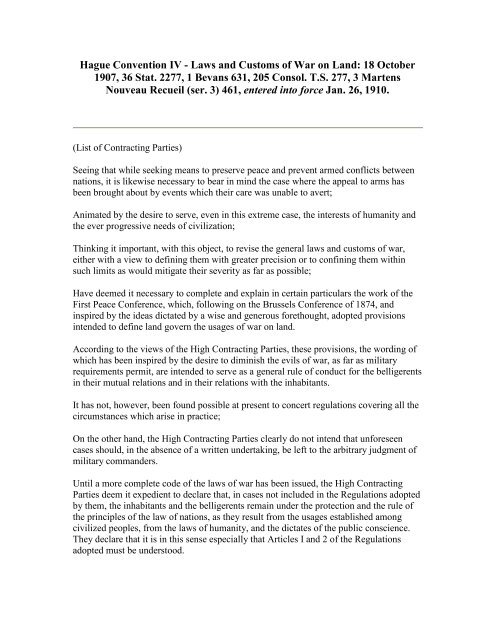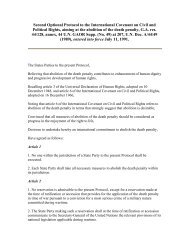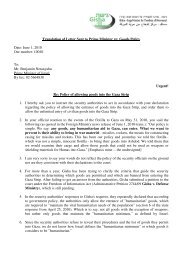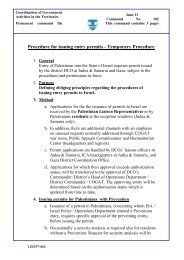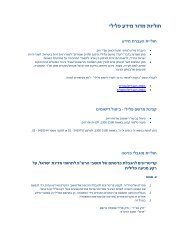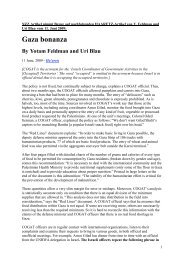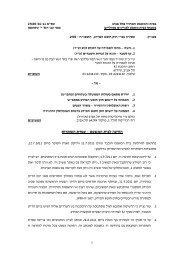Hague Convention IV - Laws and Customs of War on Land ... - Gisha
Hague Convention IV - Laws and Customs of War on Land ... - Gisha
Hague Convention IV - Laws and Customs of War on Land ... - Gisha
Create successful ePaper yourself
Turn your PDF publications into a flip-book with our unique Google optimized e-Paper software.
<str<strong>on</strong>g>Hague</str<strong>on</strong>g> <str<strong>on</strong>g>C<strong>on</strong>venti<strong>on</strong></str<strong>on</strong>g> <str<strong>on</strong>g>IV</str<strong>on</strong>g> - <str<strong>on</strong>g>Laws</str<strong>on</strong>g> <str<strong>on</strong>g>and</str<strong>on</strong>g> <str<strong>on</strong>g>Customs</str<strong>on</strong>g> <str<strong>on</strong>g>of</str<strong>on</strong>g> <str<strong>on</strong>g>War</str<strong>on</strong>g> <strong>on</strong> L<str<strong>on</strong>g>and</str<strong>on</strong>g>: 18 October1907, 36 Stat. 2277, 1 Bevans 631, 205 C<strong>on</strong>sol. T.S. 277, 3 MartensNouveau Recueil (ser. 3) 461, entered into force Jan. 26, 1910.(List <str<strong>on</strong>g>of</str<strong>on</strong>g> C<strong>on</strong>tracting Parties)Seeing that while seeking means to preserve peace <str<strong>on</strong>g>and</str<strong>on</strong>g> prevent armed c<strong>on</strong>flicts betweennati<strong>on</strong>s, it is likewise necessary to bear in mind the case where the appeal to arms hasbeen brought about by events which their care was unable to avert;Animated by the desire to serve, even in this extreme case, the interests <str<strong>on</strong>g>of</str<strong>on</strong>g> humanity <str<strong>on</strong>g>and</str<strong>on</strong>g>the ever progressive needs <str<strong>on</strong>g>of</str<strong>on</strong>g> civilizati<strong>on</strong>;Thinking it important, with this object, to revise the general laws <str<strong>on</strong>g>and</str<strong>on</strong>g> customs <str<strong>on</strong>g>of</str<strong>on</strong>g> war,either with a view to defining them with greater precisi<strong>on</strong> or to c<strong>on</strong>fining them withinsuch limits as would mitigate their severity as far as possible;Have deemed it necessary to complete <str<strong>on</strong>g>and</str<strong>on</strong>g> explain in certain particulars the work <str<strong>on</strong>g>of</str<strong>on</strong>g> theFirst Peace C<strong>on</strong>ference, which, following <strong>on</strong> the Brussels C<strong>on</strong>ference <str<strong>on</strong>g>of</str<strong>on</strong>g> 1874, <str<strong>on</strong>g>and</str<strong>on</strong>g>inspired by the ideas dictated by a wise <str<strong>on</strong>g>and</str<strong>on</strong>g> generous forethought, adopted provisi<strong>on</strong>sintended to define l<str<strong>on</strong>g>and</str<strong>on</strong>g> govern the usages <str<strong>on</strong>g>of</str<strong>on</strong>g> war <strong>on</strong> l<str<strong>on</strong>g>and</str<strong>on</strong>g>.According to the views <str<strong>on</strong>g>of</str<strong>on</strong>g> the High C<strong>on</strong>tracting Parties, these provisi<strong>on</strong>s, the wording <str<strong>on</strong>g>of</str<strong>on</strong>g>which has been inspired by the desire to diminish the evils <str<strong>on</strong>g>of</str<strong>on</strong>g> war, as far as militaryrequirements permit, are intended to serve as a general rule <str<strong>on</strong>g>of</str<strong>on</strong>g> c<strong>on</strong>duct for the belligerentsin their mutual relati<strong>on</strong>s <str<strong>on</strong>g>and</str<strong>on</strong>g> in their relati<strong>on</strong>s with the inhabitants.It has not, however, been found possible at present to c<strong>on</strong>cert regulati<strong>on</strong>s covering all thecircumstances which arise in practice;On the other h<str<strong>on</strong>g>and</str<strong>on</strong>g>, the High C<strong>on</strong>tracting Parties clearly do not intend that unforeseencases should, in the absence <str<strong>on</strong>g>of</str<strong>on</strong>g> a written undertaking, be left to the arbitrary judgment <str<strong>on</strong>g>of</str<strong>on</strong>g>military comm<str<strong>on</strong>g>and</str<strong>on</strong>g>ers.Until a more complete code <str<strong>on</strong>g>of</str<strong>on</strong>g> the laws <str<strong>on</strong>g>of</str<strong>on</strong>g> war has been issued, the High C<strong>on</strong>tractingParties deem it expedient to declare that, in cases not included in the Regulati<strong>on</strong>s adoptedby them, the inhabitants <str<strong>on</strong>g>and</str<strong>on</strong>g> the belligerents remain under the protecti<strong>on</strong> <str<strong>on</strong>g>and</str<strong>on</strong>g> the rule <str<strong>on</strong>g>of</str<strong>on</strong>g>the principles <str<strong>on</strong>g>of</str<strong>on</strong>g> the law <str<strong>on</strong>g>of</str<strong>on</strong>g> nati<strong>on</strong>s, as they result from the usages established am<strong>on</strong>gcivilized peoples, from the laws <str<strong>on</strong>g>of</str<strong>on</strong>g> humanity, <str<strong>on</strong>g>and</str<strong>on</strong>g> the dictates <str<strong>on</strong>g>of</str<strong>on</strong>g> the public c<strong>on</strong>science.They declare that it is in this sense especially that Articles I <str<strong>on</strong>g>and</str<strong>on</strong>g> 2 <str<strong>on</strong>g>of</str<strong>on</strong>g> the Regulati<strong>on</strong>sadopted must be understood.
The Power which desires to adhere notifies in writing its intenti<strong>on</strong> to the Netherl<str<strong>on</strong>g>and</str<strong>on</strong>g>sGovernment, forwarding to it the act <str<strong>on</strong>g>of</str<strong>on</strong>g> adhesi<strong>on</strong>, which shall be deposited in the archives<str<strong>on</strong>g>of</str<strong>on</strong>g> the said Government.This Government shall at <strong>on</strong>ce transmit to all the other Powers a duly certified copy <str<strong>on</strong>g>of</str<strong>on</strong>g>the notificati<strong>on</strong> as well as <str<strong>on</strong>g>of</str<strong>on</strong>g> the act <str<strong>on</strong>g>of</str<strong>on</strong>g> adhesi<strong>on</strong>, menti<strong>on</strong>ing the date <strong>on</strong> which it receivedthe notificati<strong>on</strong>.Art. 7. The present <str<strong>on</strong>g>C<strong>on</strong>venti<strong>on</strong></str<strong>on</strong>g> shall come into force, in the case <str<strong>on</strong>g>of</str<strong>on</strong>g> the Powers whichwere a party to the first deposit <str<strong>on</strong>g>of</str<strong>on</strong>g> ratificati<strong>on</strong>s, sixty days after the date <str<strong>on</strong>g>of</str<strong>on</strong>g> the procèsverbal<str<strong>on</strong>g>of</str<strong>on</strong>g> this deposit, <str<strong>on</strong>g>and</str<strong>on</strong>g>, in the case <str<strong>on</strong>g>of</str<strong>on</strong>g> the Powers which ratify subsequently or whichadhere, sixty days after the notificati<strong>on</strong> <str<strong>on</strong>g>of</str<strong>on</strong>g> their ratificati<strong>on</strong> or <str<strong>on</strong>g>of</str<strong>on</strong>g> their adhesi<strong>on</strong> has beenreceived by the Netherl<str<strong>on</strong>g>and</str<strong>on</strong>g>s Government.Art. 8. In the event <str<strong>on</strong>g>of</str<strong>on</strong>g> <strong>on</strong>e <str<strong>on</strong>g>of</str<strong>on</strong>g> the C<strong>on</strong>tracting Powers wishing to denounce the present<str<strong>on</strong>g>C<strong>on</strong>venti<strong>on</strong></str<strong>on</strong>g>, the denunciati<strong>on</strong> shall be notified in writing to the Netherl<str<strong>on</strong>g>and</str<strong>on</strong>g>s Government,which shall at <strong>on</strong>ce communicate a duly certified copy <str<strong>on</strong>g>of</str<strong>on</strong>g> the notificati<strong>on</strong> to all the otherPowers, informing them <str<strong>on</strong>g>of</str<strong>on</strong>g> the date <strong>on</strong> which it was received.The denunciati<strong>on</strong> shall <strong>on</strong>ly have effect in regard to the notifying Power, l<str<strong>on</strong>g>and</str<strong>on</strong>g> <strong>on</strong>e yearafter the notificati<strong>on</strong> has reached the Netherl<str<strong>on</strong>g>and</str<strong>on</strong>g>s Government.Art. 9. A register kept by the Netherl<str<strong>on</strong>g>and</str<strong>on</strong>g>s Ministry for Foreign Affairs shall give the date<str<strong>on</strong>g>of</str<strong>on</strong>g> the deposit <str<strong>on</strong>g>of</str<strong>on</strong>g> ratificati<strong>on</strong>s made in virtue <str<strong>on</strong>g>of</str<strong>on</strong>g> Article 5, paragraphs 3 l<str<strong>on</strong>g>and</str<strong>on</strong>g> 4, as well asthe date <strong>on</strong> which the notificati<strong>on</strong>s <str<strong>on</strong>g>of</str<strong>on</strong>g> adhesi<strong>on</strong> (Article 6, paragraph 2), or <str<strong>on</strong>g>of</str<strong>on</strong>g>denunciati<strong>on</strong> (Article 8, paragraph 1) were received.Each C<strong>on</strong>tracting Power is entitled to have access to this register <str<strong>on</strong>g>and</str<strong>on</strong>g> to be supplied withduly certified extracts.In faith where<str<strong>on</strong>g>of</str<strong>on</strong>g> the Plenipotentiaries have appended their signatures to the present<str<strong>on</strong>g>C<strong>on</strong>venti<strong>on</strong></str<strong>on</strong>g>.D<strong>on</strong>e at The <str<strong>on</strong>g>Hague</str<strong>on</strong>g> 18 October 1907, in a single copy, which shall remain deposited inthe archives <str<strong>on</strong>g>of</str<strong>on</strong>g> the Netherl<str<strong>on</strong>g>and</str<strong>on</strong>g>s Government, <str<strong>on</strong>g>and</str<strong>on</strong>g> duly certified copies <str<strong>on</strong>g>of</str<strong>on</strong>g> which shall besent, through the diplomatic channel to the Powers which have been invited to the Sec<strong>on</strong>dPeace C<strong>on</strong>ference.(Here follow signatures)ANNEX TO THE CONVENTIONREGULATIONS RESPECTING THE LAWS AND CUSTOMS OF WAR ON LANDSECTION I
ON BELLIGERENTSCHAPTER IThe qualificati<strong>on</strong>s <str<strong>on</strong>g>of</str<strong>on</strong>g> belligerentsArticle 1. The laws, rights, <str<strong>on</strong>g>and</str<strong>on</strong>g> duties <str<strong>on</strong>g>of</str<strong>on</strong>g> war apply not <strong>on</strong>ly to armies, but also to militia<str<strong>on</strong>g>and</str<strong>on</strong>g> volunteer corps fulfilling the following c<strong>on</strong>diti<strong>on</strong>s:1. To be comm<str<strong>on</strong>g>and</str<strong>on</strong>g>ed by a pers<strong>on</strong> resp<strong>on</strong>sible for his subordinates;2. To have a fixed distinctive emblem recognizable at a distance;3. To carry arms openly; <str<strong>on</strong>g>and</str<strong>on</strong>g>4. To c<strong>on</strong>duct their operati<strong>on</strong>s in accordance with the laws <str<strong>on</strong>g>and</str<strong>on</strong>g> customs <str<strong>on</strong>g>of</str<strong>on</strong>g> war.In countries where militia or volunteer corps c<strong>on</strong>stitute the army, or form part <str<strong>on</strong>g>of</str<strong>on</strong>g> it, theyare included under the denominati<strong>on</strong> "army."Art. 2. The inhabitants <str<strong>on</strong>g>of</str<strong>on</strong>g> a territory which has not been occupied, who, <strong>on</strong> the approach<str<strong>on</strong>g>of</str<strong>on</strong>g> the enemy, sp<strong>on</strong>taneously take up arms to resist the invading troops without havinghad time to organize themselves in accordance with Article 1, shall be regarded asbelligerents if they carry arms openly <str<strong>on</strong>g>and</str<strong>on</strong>g> if they respect the laws <str<strong>on</strong>g>and</str<strong>on</strong>g> customs <str<strong>on</strong>g>of</str<strong>on</strong>g> war.Art. 3. The armed forces <str<strong>on</strong>g>of</str<strong>on</strong>g> the belligerent parties may c<strong>on</strong>sist <str<strong>on</strong>g>of</str<strong>on</strong>g> combatants <str<strong>on</strong>g>and</str<strong>on</strong>g> n<strong>on</strong>combatants.In the case <str<strong>on</strong>g>of</str<strong>on</strong>g> capture by the enemy, both have a right to be treated aspris<strong>on</strong>ers <str<strong>on</strong>g>of</str<strong>on</strong>g> war.CHAPTER IIPris<strong>on</strong>ers <str<strong>on</strong>g>of</str<strong>on</strong>g> warArt. 4. Pris<strong>on</strong>ers <str<strong>on</strong>g>of</str<strong>on</strong>g> war are in the power <str<strong>on</strong>g>of</str<strong>on</strong>g> the hostile Government, but not <str<strong>on</strong>g>of</str<strong>on</strong>g> theindividuals or corps who capture them.They must be humanely treated.All their pers<strong>on</strong>al bel<strong>on</strong>gings, except arms, horses, <str<strong>on</strong>g>and</str<strong>on</strong>g> military papers, remain theirproperty.Art. 5. Pris<strong>on</strong>ers <str<strong>on</strong>g>of</str<strong>on</strong>g> war may be interned in a town, fortress, camp, or other place, <str<strong>on</strong>g>and</str<strong>on</strong>g>bound not to go bey<strong>on</strong>d certain fixed limits; but they cannot be c<strong>on</strong>fined except as in
indispensable measure <str<strong>on</strong>g>of</str<strong>on</strong>g> safety l<str<strong>on</strong>g>and</str<strong>on</strong>g> <strong>on</strong>ly while the circumstances which necessitate themeasure c<strong>on</strong>tinue to exist.Art. 6. The State may utilize the labour <str<strong>on</strong>g>of</str<strong>on</strong>g> pris<strong>on</strong>ers <str<strong>on</strong>g>of</str<strong>on</strong>g> war according to their rank <str<strong>on</strong>g>and</str<strong>on</strong>g>aptitude, <str<strong>on</strong>g>of</str<strong>on</strong>g>ficers excepted. The tasks shall not be excessive <str<strong>on</strong>g>and</str<strong>on</strong>g> shall have no c<strong>on</strong>necti<strong>on</strong>with the operati<strong>on</strong>s <str<strong>on</strong>g>of</str<strong>on</strong>g> the war.Pris<strong>on</strong>ers may be authorized to work for the public service, for private pers<strong>on</strong>s, or <strong>on</strong>their own account. Work d<strong>on</strong>e for the State is paid for at the rates in force for work <str<strong>on</strong>g>of</str<strong>on</strong>g> asimilar kind d<strong>on</strong>e by soldiers <str<strong>on</strong>g>of</str<strong>on</strong>g> the nati<strong>on</strong>al army, or, if there are n<strong>on</strong>e in force, at a rateaccording to the work executed.When the work is for other branches <str<strong>on</strong>g>of</str<strong>on</strong>g> the public service or for private pers<strong>on</strong>s thec<strong>on</strong>diti<strong>on</strong>s are settled in agreement with the military authorities.The wages <str<strong>on</strong>g>of</str<strong>on</strong>g> the pris<strong>on</strong>ers shall go towards improving their positi<strong>on</strong>, <str<strong>on</strong>g>and</str<strong>on</strong>g> the balanceshall be paid them <strong>on</strong> their release, after deducting the cost <str<strong>on</strong>g>of</str<strong>on</strong>g> their maintenance.Art. 7. The Government into whose h<str<strong>on</strong>g>and</str<strong>on</strong>g>s pris<strong>on</strong>ers <str<strong>on</strong>g>of</str<strong>on</strong>g> war have fallen is charged withtheir maintenance. In the absence <str<strong>on</strong>g>of</str<strong>on</strong>g> a special agreement between the belligerents,pris<strong>on</strong>ers <str<strong>on</strong>g>of</str<strong>on</strong>g> war shall be treated as regards board, lodging, <str<strong>on</strong>g>and</str<strong>on</strong>g> clothing <strong>on</strong> the samefooting as the troops <str<strong>on</strong>g>of</str<strong>on</strong>g> the Government who captured them.Art. 8. Pris<strong>on</strong>ers <str<strong>on</strong>g>of</str<strong>on</strong>g> war shall be subject to the laws, regulati<strong>on</strong>s, <str<strong>on</strong>g>and</str<strong>on</strong>g> orders in force in thearmy <str<strong>on</strong>g>of</str<strong>on</strong>g> the State in whose power they are. Any act <str<strong>on</strong>g>of</str<strong>on</strong>g> insubordinati<strong>on</strong> justifies theadopti<strong>on</strong> towards them <str<strong>on</strong>g>of</str<strong>on</strong>g> such measures <str<strong>on</strong>g>of</str<strong>on</strong>g> severity as may be c<strong>on</strong>sidered necessary.Escaped pris<strong>on</strong>ers who are retaken before being able to rejoin their own army or beforeleaving the territory occupied by the army which captured them are liable to disciplinarypunishment.Pris<strong>on</strong>ers who, after succeeding in escaping, are again taken pris<strong>on</strong>ers, are not liable toany punishment <strong>on</strong> account <str<strong>on</strong>g>of</str<strong>on</strong>g> the previous flight.Art. 9. Every pris<strong>on</strong>er <str<strong>on</strong>g>of</str<strong>on</strong>g> war is bound to give, if he is questi<strong>on</strong>ed <strong>on</strong> the subject, his truename <str<strong>on</strong>g>and</str<strong>on</strong>g> rank, <str<strong>on</strong>g>and</str<strong>on</strong>g> if he infringes this rule, he is liable to have the advantages given topris<strong>on</strong>ers <str<strong>on</strong>g>of</str<strong>on</strong>g> his class curtailed.Art. 10. Pris<strong>on</strong>ers <str<strong>on</strong>g>of</str<strong>on</strong>g> war may be set at liberty <strong>on</strong> parole if the laws <str<strong>on</strong>g>of</str<strong>on</strong>g> their country allow,<str<strong>on</strong>g>and</str<strong>on</strong>g>, in such cases, they are bound, <strong>on</strong> their pers<strong>on</strong>al h<strong>on</strong>our, scrupulously to fulfil, bothtowards their own Government <str<strong>on</strong>g>and</str<strong>on</strong>g> the Government by whom they were made pris<strong>on</strong>ers,the engagements they have c<strong>on</strong>tracted.In such cases their own Government is bound neither to require <str<strong>on</strong>g>of</str<strong>on</strong>g> nor accept from themany service incompatible with the parole given.
Presents <str<strong>on</strong>g>and</str<strong>on</strong>g> relief in kind for pris<strong>on</strong>ers <str<strong>on</strong>g>of</str<strong>on</strong>g> war shall be admitted free <str<strong>on</strong>g>of</str<strong>on</strong>g> all import orother duties, as well as <str<strong>on</strong>g>of</str<strong>on</strong>g> payments for carriage by the State railways.Art. 17. Officers taken pris<strong>on</strong>ers shall receive the same rate <str<strong>on</strong>g>of</str<strong>on</strong>g> pay as <str<strong>on</strong>g>of</str<strong>on</strong>g>ficers <str<strong>on</strong>g>of</str<strong>on</strong>g>corresp<strong>on</strong>ding rank in the country where they are detained, the amount to be ultimatelyrefunded by their own Government.Art. 18. Pris<strong>on</strong>ers <str<strong>on</strong>g>of</str<strong>on</strong>g> war shall enjoy complete liberty in the exercise <str<strong>on</strong>g>of</str<strong>on</strong>g> their religi<strong>on</strong>,including attendance at the services <str<strong>on</strong>g>of</str<strong>on</strong>g> whatever church they may bel<strong>on</strong>g to, <strong>on</strong> the solec<strong>on</strong>diti<strong>on</strong> that they comply with the measures <str<strong>on</strong>g>of</str<strong>on</strong>g> order <str<strong>on</strong>g>and</str<strong>on</strong>g> police issued by the militaryauthorities.Art. 19. The wills <str<strong>on</strong>g>of</str<strong>on</strong>g> pris<strong>on</strong>ers <str<strong>on</strong>g>of</str<strong>on</strong>g> war are received or drawn up in the same way as forsoldiers <str<strong>on</strong>g>of</str<strong>on</strong>g> the nati<strong>on</strong>al army.The same rules shall be observed regarding death certificates as well as for the burial <str<strong>on</strong>g>of</str<strong>on</strong>g>pris<strong>on</strong>ers <str<strong>on</strong>g>of</str<strong>on</strong>g> war, due regard being paid to their grade <str<strong>on</strong>g>and</str<strong>on</strong>g> rank.Art. 20. After the c<strong>on</strong>clusi<strong>on</strong> <str<strong>on</strong>g>of</str<strong>on</strong>g> peace, the repatriati<strong>on</strong> <str<strong>on</strong>g>of</str<strong>on</strong>g> pris<strong>on</strong>ers <str<strong>on</strong>g>of</str<strong>on</strong>g> war shall be carriedout as quickly as possible.CHAPTER IIIThe sick <str<strong>on</strong>g>and</str<strong>on</strong>g> woundedArt. 21. The obligati<strong>on</strong>s <str<strong>on</strong>g>of</str<strong>on</strong>g> belligerents with regard to the sick <str<strong>on</strong>g>and</str<strong>on</strong>g> wounded are governedby the Geneva <str<strong>on</strong>g>C<strong>on</strong>venti<strong>on</strong></str<strong>on</strong>g>.SECTION IIHOSTILITIESCHAPTER IMeans <str<strong>on</strong>g>of</str<strong>on</strong>g> injuring the enemy, sieges, <str<strong>on</strong>g>and</str<strong>on</strong>g> bombardmentsArt. 22. The right <str<strong>on</strong>g>of</str<strong>on</strong>g> belligerents to adopt means <str<strong>on</strong>g>of</str<strong>on</strong>g> injuring the enemy is not unlimited.Art. 23. In additi<strong>on</strong> to the prohibiti<strong>on</strong>s provided by special <str<strong>on</strong>g>C<strong>on</strong>venti<strong>on</strong></str<strong>on</strong>g>s, it is especiallyforbidden (a) To employ pois<strong>on</strong> or pois<strong>on</strong>ed weap<strong>on</strong>s;(b) To kill or wound treacherously individuals bel<strong>on</strong>ging to the hostile nati<strong>on</strong> or army;
(c) To kill or wound an enemy who, having laid down his arms, or having no l<strong>on</strong>germeans <str<strong>on</strong>g>of</str<strong>on</strong>g> defence, has surrendered at discreti<strong>on</strong>;(d) To declare that no quarter will be given; (e) To employ arms, projectiles, or materialcalculated to cause unnecessary suffering;(f) To make improper use <str<strong>on</strong>g>of</str<strong>on</strong>g> a flag <str<strong>on</strong>g>of</str<strong>on</strong>g> truce, <str<strong>on</strong>g>of</str<strong>on</strong>g> the nati<strong>on</strong>al flag or <str<strong>on</strong>g>of</str<strong>on</strong>g> the military insignia<str<strong>on</strong>g>and</str<strong>on</strong>g> uniform <str<strong>on</strong>g>of</str<strong>on</strong>g> the enemy, as well as the distinctive badges <str<strong>on</strong>g>of</str<strong>on</strong>g> the Geneva <str<strong>on</strong>g>C<strong>on</strong>venti<strong>on</strong></str<strong>on</strong>g>;(g) To destroy or seize the enemy's property, unless such destructi<strong>on</strong> or seizure beimperatively dem<str<strong>on</strong>g>and</str<strong>on</strong>g>ed by the necessities <str<strong>on</strong>g>of</str<strong>on</strong>g> war;(h) To declare abolished, suspended, or inadmissible in a court <str<strong>on</strong>g>of</str<strong>on</strong>g> law the rights <str<strong>on</strong>g>and</str<strong>on</strong>g>acti<strong>on</strong>s <str<strong>on</strong>g>of</str<strong>on</strong>g> the nati<strong>on</strong>als <str<strong>on</strong>g>of</str<strong>on</strong>g> the hostile party.A belligerent is likewise forbidden to compel the nati<strong>on</strong>als <str<strong>on</strong>g>of</str<strong>on</strong>g> the hostile party to take partin the operati<strong>on</strong>s <str<strong>on</strong>g>of</str<strong>on</strong>g> war directed against their own country, even if they were in thebelligerent's service before the commencement <str<strong>on</strong>g>of</str<strong>on</strong>g> the war.Art. 24. Ruses <str<strong>on</strong>g>of</str<strong>on</strong>g> war <str<strong>on</strong>g>and</str<strong>on</strong>g> the employment <str<strong>on</strong>g>of</str<strong>on</strong>g> measures necessary for obtaininginformati<strong>on</strong> about the enemy <str<strong>on</strong>g>and</str<strong>on</strong>g> the country are c<strong>on</strong>sidered permissible.Art. 25. The attack or bombardment, by whatever means, <str<strong>on</strong>g>of</str<strong>on</strong>g> towns, villages, dwellings, orbuildings which are undefended is prohibited.Art. 26. The <str<strong>on</strong>g>of</str<strong>on</strong>g>ficer in comm<str<strong>on</strong>g>and</str<strong>on</strong>g> <str<strong>on</strong>g>of</str<strong>on</strong>g> an attacking force must, before commencing abombardment, except in cases <str<strong>on</strong>g>of</str<strong>on</strong>g> assault, do all in his power to warn the authorities.Art. 27. In sieges <str<strong>on</strong>g>and</str<strong>on</strong>g> bombardments all necessary steps must be taken to spare, as far aspossible, buildings dedicated to religi<strong>on</strong>, art, science, or charitable purposes, historicm<strong>on</strong>uments, hospitals, <str<strong>on</strong>g>and</str<strong>on</strong>g> places where the sick <str<strong>on</strong>g>and</str<strong>on</strong>g> wounded are collected, providedthey are not being used at the time for military purposes. It is the duty <str<strong>on</strong>g>of</str<strong>on</strong>g> the besieged toindicate the presence <str<strong>on</strong>g>of</str<strong>on</strong>g> such buildings or places by distinctive <str<strong>on</strong>g>and</str<strong>on</strong>g> visible signs, whichshall be notified to the enemy beforeh<str<strong>on</strong>g>and</str<strong>on</strong>g>.Art. 28. The pillage <str<strong>on</strong>g>of</str<strong>on</strong>g> a town or place, even when taken by assault, is prohibited.CHAPTER IISpiesArt. 29. A pers<strong>on</strong> can <strong>on</strong>ly be c<strong>on</strong>sidered a spy when, acting cl<str<strong>on</strong>g>and</str<strong>on</strong>g>estinely or <strong>on</strong> falsepretences, he obtains or endeavours to obtain informati<strong>on</strong> in the z<strong>on</strong>e <str<strong>on</strong>g>of</str<strong>on</strong>g> operati<strong>on</strong>s <str<strong>on</strong>g>of</str<strong>on</strong>g> abelligerent, with the intenti<strong>on</strong> <str<strong>on</strong>g>of</str<strong>on</strong>g> communicating it to the hostile party.
Thus, soldiers not wearing a disguise who have penetrated into the z<strong>on</strong>e <str<strong>on</strong>g>of</str<strong>on</strong>g> operati<strong>on</strong>s <str<strong>on</strong>g>of</str<strong>on</strong>g>the hostile army, for the purpose <str<strong>on</strong>g>of</str<strong>on</strong>g> obtaining informati<strong>on</strong>, are not c<strong>on</strong>sidered spies.Similarly, the following are not c<strong>on</strong>sidered spies: Soldiers <str<strong>on</strong>g>and</str<strong>on</strong>g> civilians, carrying out theirmissi<strong>on</strong> openly, entrusted with the delivery <str<strong>on</strong>g>of</str<strong>on</strong>g> despatches intended either for their ownarmy or for the enemy's army. To this class bel<strong>on</strong>g likewise pers<strong>on</strong>s sent in ballo<strong>on</strong>s forthe purpose <str<strong>on</strong>g>of</str<strong>on</strong>g> carrying despatches <str<strong>on</strong>g>and</str<strong>on</strong>g>, generally, <str<strong>on</strong>g>of</str<strong>on</strong>g> maintaining communicati<strong>on</strong>sbetween the different parts <str<strong>on</strong>g>of</str<strong>on</strong>g> an army or a territory.Art. 30. A spy taken in the act shall not be punished without previous trial.Art. 31. A spy who, after rejoining the army to which he bel<strong>on</strong>gs, is subsequentlycaptured by the enemy, is treated as a pris<strong>on</strong>er <str<strong>on</strong>g>of</str<strong>on</strong>g> war, <str<strong>on</strong>g>and</str<strong>on</strong>g> incurs no resp<strong>on</strong>sibility for hisprevious acts <str<strong>on</strong>g>of</str<strong>on</strong>g> espi<strong>on</strong>age.CHAPTER IIIFlags <str<strong>on</strong>g>of</str<strong>on</strong>g> truceArt. 32. A pers<strong>on</strong> is regarded as a parlementaire who has been authorized by <strong>on</strong>e <str<strong>on</strong>g>of</str<strong>on</strong>g> thebelligerents to enter into communicati<strong>on</strong> with the other, <str<strong>on</strong>g>and</str<strong>on</strong>g> who advances bearing awhite flag. He has a right to inviolability, as well as the trumpeter, bugler or drummer,the flag-bearer <str<strong>on</strong>g>and</str<strong>on</strong>g> interpreter who may accompany him.Art. 33. The comm<str<strong>on</strong>g>and</str<strong>on</strong>g>er to whom a parlementaire is sent is not in all cases obliged toreceive him.He may take all the necessary steps to prevent the parlementaire taking advantage <str<strong>on</strong>g>of</str<strong>on</strong>g> hismissi<strong>on</strong> to obtain informati<strong>on</strong>.In case <str<strong>on</strong>g>of</str<strong>on</strong>g> abuse, he has the right to detain the parlementaire temporarily.Art. 34. The parlementaire loses his rights <str<strong>on</strong>g>of</str<strong>on</strong>g> inviolability if it is proved in a clear <str<strong>on</strong>g>and</str<strong>on</strong>g>inc<strong>on</strong>testable manner that he has taken advantage <str<strong>on</strong>g>of</str<strong>on</strong>g> his privileged positi<strong>on</strong> to provoke orcommit an act <str<strong>on</strong>g>of</str<strong>on</strong>g> treas<strong>on</strong>.CHAPTER <str<strong>on</strong>g>IV</str<strong>on</strong>g>Capitulati<strong>on</strong>sArt. 35. Capitulati<strong>on</strong>s agreed up<strong>on</strong> between the C<strong>on</strong>tracting Parties must take intoaccount the rules <str<strong>on</strong>g>of</str<strong>on</strong>g> military h<strong>on</strong>our.
Once settled, they must be scrupulously observed by both parties.CHAPTER VArmisticesArt. 36. An armistice suspends military operati<strong>on</strong>s by mutual agreement between thebelligerent parties. If its durati<strong>on</strong> is not defined, the belligerent parties may resumeoperati<strong>on</strong>s at any time, provided always that the enemy is warned within the time agreedup<strong>on</strong>, in accordance with the terms <str<strong>on</strong>g>of</str<strong>on</strong>g> the armistice.Art. 37. An armistice may be general or local. The first suspends the military operati<strong>on</strong>s<str<strong>on</strong>g>of</str<strong>on</strong>g> the belligerent States everywhere; the sec<strong>on</strong>d <strong>on</strong>ly between certain fracti<strong>on</strong>s <str<strong>on</strong>g>of</str<strong>on</strong>g> thebelligerent armies <str<strong>on</strong>g>and</str<strong>on</strong>g> within a fixed radius.Art. 38. An armistice must be notified <str<strong>on</strong>g>of</str<strong>on</strong>g>ficially <str<strong>on</strong>g>and</str<strong>on</strong>g> in good time to the competentauthorities <str<strong>on</strong>g>and</str<strong>on</strong>g> to the troops. Hostilities are suspended immediately after the notificati<strong>on</strong>,or <strong>on</strong> the date fixed.Art. 39. It rests with the C<strong>on</strong>tracting Parties to settle, in the terms <str<strong>on</strong>g>of</str<strong>on</strong>g> the armistice, whatcommunicati<strong>on</strong>s may be held in the theatre <str<strong>on</strong>g>of</str<strong>on</strong>g> war with the inhabitants <str<strong>on</strong>g>and</str<strong>on</strong>g> between theinhabitants <str<strong>on</strong>g>of</str<strong>on</strong>g> <strong>on</strong>e belligerent State <str<strong>on</strong>g>and</str<strong>on</strong>g> those <str<strong>on</strong>g>of</str<strong>on</strong>g> the other.Art. 40. Any serious violati<strong>on</strong> <str<strong>on</strong>g>of</str<strong>on</strong>g> the armistice by <strong>on</strong>e <str<strong>on</strong>g>of</str<strong>on</strong>g> the parties gives the other partythe right <str<strong>on</strong>g>of</str<strong>on</strong>g> denouncing it, <str<strong>on</strong>g>and</str<strong>on</strong>g> even, in cases <str<strong>on</strong>g>of</str<strong>on</strong>g> urgency, <str<strong>on</strong>g>of</str<strong>on</strong>g> recommencing hostilitiesimmediately.Art. 41. A violati<strong>on</strong> <str<strong>on</strong>g>of</str<strong>on</strong>g> the terms <str<strong>on</strong>g>of</str<strong>on</strong>g> the armistice by private pers<strong>on</strong>s acting <strong>on</strong> their owninitiative <strong>on</strong>ly entitles the injured party to dem<str<strong>on</strong>g>and</str<strong>on</strong>g> the punishment <str<strong>on</strong>g>of</str<strong>on</strong>g> the <str<strong>on</strong>g>of</str<strong>on</strong>g>fenders or, ifnecessary, compensati<strong>on</strong> for the losses sustained.SECTION IIIMILITARY AUTHORITY OVER THE TERRITORY OF THE HOSTILE STATEArt. 42. Territory is c<strong>on</strong>sidered occupied when it is actually placed under the authority <str<strong>on</strong>g>of</str<strong>on</strong>g>the hostile army. The occupati<strong>on</strong> extends <strong>on</strong>ly to the territory where such authority hasbeen established <str<strong>on</strong>g>and</str<strong>on</strong>g> can be exercised.Art. 43. The authority <str<strong>on</strong>g>of</str<strong>on</strong>g> the legitimate power having in fact passed into the h<str<strong>on</strong>g>and</str<strong>on</strong>g>s <str<strong>on</strong>g>of</str<strong>on</strong>g> theoccupant, the latter shall take all the measures in his power to restore, <str<strong>on</strong>g>and</str<strong>on</strong>g> ensure, as faras possible, public order <str<strong>on</strong>g>and</str<strong>on</strong>g> safety, while respecting, unless absolutely prevented, thelaws in force in the country.
Art. 44. A belligerent is forbidden to force the inhabitants <str<strong>on</strong>g>of</str<strong>on</strong>g> territory occupied by it t<str<strong>on</strong>g>of</str<strong>on</strong>g>urnish informati<strong>on</strong> about the army <str<strong>on</strong>g>of</str<strong>on</strong>g> the other belligerent, or about its means <str<strong>on</strong>g>of</str<strong>on</strong>g> defense.Art. 45. It is forbidden to compel the inhabitants <str<strong>on</strong>g>of</str<strong>on</strong>g> occupied territory to swear allegianceto the hostile Power.Art. 46. Family h<strong>on</strong>our <str<strong>on</strong>g>and</str<strong>on</strong>g> rights, the lives <str<strong>on</strong>g>of</str<strong>on</strong>g> pers<strong>on</strong>s, <str<strong>on</strong>g>and</str<strong>on</strong>g> private property, as well asreligious c<strong>on</strong>victi<strong>on</strong>s <str<strong>on</strong>g>and</str<strong>on</strong>g> practice, must be respected.Private property cannot be c<strong>on</strong>fiscated.Art. 47. Pillage is formally forbidden.Art. 48. If, in the territory occupied, the occupant collects the taxes, dues, <str<strong>on</strong>g>and</str<strong>on</strong>g> tollsimposed for the benefit <str<strong>on</strong>g>of</str<strong>on</strong>g> the State, he shall do so, as far as is possible, in accordancewith the rules <str<strong>on</strong>g>of</str<strong>on</strong>g> assessment <str<strong>on</strong>g>and</str<strong>on</strong>g> incidence in force, <str<strong>on</strong>g>and</str<strong>on</strong>g> shall in c<strong>on</strong>sequence be bound todefray the expenses <str<strong>on</strong>g>of</str<strong>on</strong>g> the administrati<strong>on</strong> <str<strong>on</strong>g>of</str<strong>on</strong>g> the occupied territory to the same extent asthe legitimate Government was so bound.Art. 49. If, in additi<strong>on</strong> to the taxes menti<strong>on</strong>ed in the above article, the occupant leviesother m<strong>on</strong>ey c<strong>on</strong>tributi<strong>on</strong>s in the occupied territory, this shall <strong>on</strong>ly be for the needs <str<strong>on</strong>g>of</str<strong>on</strong>g> thearmy or <str<strong>on</strong>g>of</str<strong>on</strong>g> the administrati<strong>on</strong> <str<strong>on</strong>g>of</str<strong>on</strong>g> the territory in questi<strong>on</strong>.Art. 50. No general penalty, pecuniary or otherwise, shall be inflicted up<strong>on</strong> thepopulati<strong>on</strong> <strong>on</strong> account <str<strong>on</strong>g>of</str<strong>on</strong>g> the acts <str<strong>on</strong>g>of</str<strong>on</strong>g> individuals for which they cannot be regarded asjointly <str<strong>on</strong>g>and</str<strong>on</strong>g> severally resp<strong>on</strong>sible.Art. 51. No c<strong>on</strong>tributi<strong>on</strong> shall be collected except under a written order, <str<strong>on</strong>g>and</str<strong>on</strong>g> <strong>on</strong> theresp<strong>on</strong>sibility <str<strong>on</strong>g>of</str<strong>on</strong>g> a comm<str<strong>on</strong>g>and</str<strong>on</strong>g>er-in-chief.The collecti<strong>on</strong> <str<strong>on</strong>g>of</str<strong>on</strong>g> the said c<strong>on</strong>tributi<strong>on</strong> shall <strong>on</strong>ly be effected as far as possible inaccordance with the rules <str<strong>on</strong>g>of</str<strong>on</strong>g> assessment <str<strong>on</strong>g>and</str<strong>on</strong>g> incidence <str<strong>on</strong>g>of</str<strong>on</strong>g> the taxes in force. For everyc<strong>on</strong>tributi<strong>on</strong> a receipt shall be given to the c<strong>on</strong>tributors.Art. 52. Requisiti<strong>on</strong>s in kind <str<strong>on</strong>g>and</str<strong>on</strong>g> services shall not be dem<str<strong>on</strong>g>and</str<strong>on</strong>g>ed from municipalities orinhabitants except for the needs <str<strong>on</strong>g>of</str<strong>on</strong>g> the army <str<strong>on</strong>g>of</str<strong>on</strong>g> occupati<strong>on</strong>. They shall be in proporti<strong>on</strong> tothe resources <str<strong>on</strong>g>of</str<strong>on</strong>g> the country, <str<strong>on</strong>g>and</str<strong>on</strong>g> <str<strong>on</strong>g>of</str<strong>on</strong>g> such a nature as not to involve the inhabitants in theobligati<strong>on</strong> <str<strong>on</strong>g>of</str<strong>on</strong>g> taking part in military operati<strong>on</strong>s against their own country.Such requisiti<strong>on</strong>s <str<strong>on</strong>g>and</str<strong>on</strong>g> services shall <strong>on</strong>ly be dem<str<strong>on</strong>g>and</str<strong>on</strong>g>ed <strong>on</strong> the authority <str<strong>on</strong>g>of</str<strong>on</strong>g> the comm<str<strong>on</strong>g>and</str<strong>on</strong>g>erin the locality occupied.C<strong>on</strong>tributi<strong>on</strong>s in kind shall as far is possible be paid for in cash; if not, a receipt shall begiven l<str<strong>on</strong>g>and</str<strong>on</strong>g> the payment <str<strong>on</strong>g>of</str<strong>on</strong>g> the amount due shall be made as so<strong>on</strong> as possible.
Art. 53. An army <str<strong>on</strong>g>of</str<strong>on</strong>g> occupati<strong>on</strong> can <strong>on</strong>ly take possessi<strong>on</strong> <str<strong>on</strong>g>of</str<strong>on</strong>g> cash, funds, <str<strong>on</strong>g>and</str<strong>on</strong>g> realizablesecurities which are strictly the property <str<strong>on</strong>g>of</str<strong>on</strong>g> the State, depots <str<strong>on</strong>g>of</str<strong>on</strong>g> arms, means <str<strong>on</strong>g>of</str<strong>on</strong>g> transport,stores <str<strong>on</strong>g>and</str<strong>on</strong>g> supplies, <str<strong>on</strong>g>and</str<strong>on</strong>g>, generally, all movable property bel<strong>on</strong>ging to the State whichmay be used for military operati<strong>on</strong>s.All appliances, whether <strong>on</strong> l<str<strong>on</strong>g>and</str<strong>on</strong>g>, at sea, or in the air, adapted for the transmissi<strong>on</strong> <str<strong>on</strong>g>of</str<strong>on</strong>g>news, or for the transport <str<strong>on</strong>g>of</str<strong>on</strong>g> pers<strong>on</strong>s or things, exclusive <str<strong>on</strong>g>of</str<strong>on</strong>g> cases governed by naval law,depots <str<strong>on</strong>g>of</str<strong>on</strong>g> arms, <str<strong>on</strong>g>and</str<strong>on</strong>g>, generally, all kinds <str<strong>on</strong>g>of</str<strong>on</strong>g> muniti<strong>on</strong>s <str<strong>on</strong>g>of</str<strong>on</strong>g> war, may be seized, even if theybel<strong>on</strong>g to private individuals, but must be restored <str<strong>on</strong>g>and</str<strong>on</strong>g> compensati<strong>on</strong> fixed when peace ismade.Art. 54. Submarine cables c<strong>on</strong>necting an occupied territory with a neutral territory shallnot be seized or destroyed except in the case <str<strong>on</strong>g>of</str<strong>on</strong>g> absolute necessity. They must likewise berestored l<str<strong>on</strong>g>and</str<strong>on</strong>g> compensati<strong>on</strong> fixed when peace is made.Art. 55. The occupying State shall be regarded <strong>on</strong>ly as administrator <str<strong>on</strong>g>and</str<strong>on</strong>g> usufructuary <str<strong>on</strong>g>of</str<strong>on</strong>g>public buildings, real estate, forests, <str<strong>on</strong>g>and</str<strong>on</strong>g> agricultural estates bel<strong>on</strong>ging to the hostileState, <str<strong>on</strong>g>and</str<strong>on</strong>g> situated in the occupied country. It must safeguard the capital <str<strong>on</strong>g>of</str<strong>on</strong>g> theseproperties, <str<strong>on</strong>g>and</str<strong>on</strong>g> administer them in accordance with the rules <str<strong>on</strong>g>of</str<strong>on</strong>g> usufruct.Art. 56. The property <str<strong>on</strong>g>of</str<strong>on</strong>g> municipalities, that <str<strong>on</strong>g>of</str<strong>on</strong>g> instituti<strong>on</strong>s dedicated to religi<strong>on</strong>, charity<str<strong>on</strong>g>and</str<strong>on</strong>g> educati<strong>on</strong>, the arts <str<strong>on</strong>g>and</str<strong>on</strong>g> sciences, even when State property, shall be treated as privateproperty.All seizure <str<strong>on</strong>g>of</str<strong>on</strong>g>, destructi<strong>on</strong> or wilful damage d<strong>on</strong>e to instituti<strong>on</strong>s <str<strong>on</strong>g>of</str<strong>on</strong>g> this character, historicm<strong>on</strong>uments, works <str<strong>on</strong>g>of</str<strong>on</strong>g> art <str<strong>on</strong>g>and</str<strong>on</strong>g> science, is forbidden, <str<strong>on</strong>g>and</str<strong>on</strong>g> should be made the subject <str<strong>on</strong>g>of</str<strong>on</strong>g>legal proceedings.


